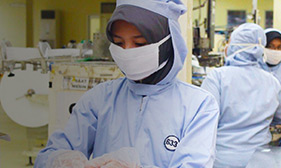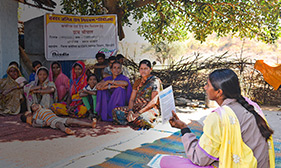
Environmental
capital

Natural
capital

Human
capital

Social and
relationship capital
Key enablers
- Developing a high-performing
and diverse workforce - Making greener products
- Investing in the health and well-being of communities
Risks identified
- Changing consumer preferences
- Regulatory
- Climate change
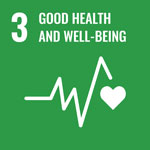
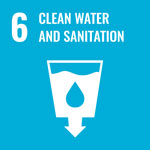
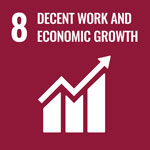
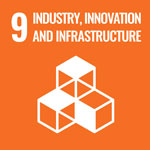
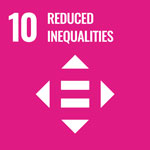
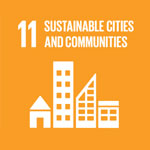
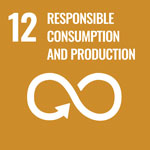
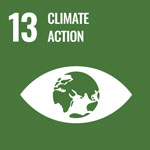
Being a 'good' company is very important to us. Ten years ago, we made a promise to build a more employable and greener world, and put people and planet alongside profit. Today, we have placed this promise at the core of our strategy.

5.72
Human capital
return on
investment

25%
Women
in senior
leadership

71%
Suppliers
assessed
for ESG

6x
Water
positive

17%
Reduction in
plastic intensity

1,598
Malaria-free
villages

ESG
Focused product
portfolio
The biggest challenges
of our time
Climate change and inequality are the biggest challenges facing humanity. Together, these challenges are making the world more volatile, affecting businesses, supply chains, and communities. The Intergovernmental Panel on Climate Change (IPCC) reaffirms that we need to cut our global emissions by more than half by 2030 to ensure a WB2DS scenario of global warming by 2050. Due to historical and rising inequality, the impact of climate change is disproportionately higher in emerging markets such as the ones where we operate.
According to the latest IPCC report AR6, global GHG emissions at the current rate will result in 1.5 degrees of global warming over pre-industrial levels by 2035. This is 15 years ahead of the 2050 threshold.
The world over, the participation of women in labour markets tends to be lower than that of men. In India, participation of women in labour is less than 25%. Public health concerns have an impact on the health of a nation. Wage loss due to preventable diseases such as malaria and dengue continues to plague many of the geographies we operate in.
We believe we have a critical role to play in changing this scenario. Society, environment, and business cannot operate in silos. Being a responsible business, we are accountable for much more to stakeholders, besides our financial performance. Sustainability is not new to us. We have always maintained a sizeable part of our promoter holdings in Godrej Trusts that invests in education, environment, and healthcare. In this increasingly uncertain world, we began our sustainability journey with the good and green vision. Ten years ago, we made a promise to build a more employable and greener world, and put people and planet alongside profit.
We believe we have a critical role to play in changing this scenario. Society, environment, and business cannot operate in silos. Being a responsible business, we are accountable for much more to stakeholders, besides our financial performance. Sustainability is not new to us. We have always maintained a sizeable part of our promoter holdings in Godrej Trusts that invests in education, environment, and healthcare.
In this increasingly uncertain world, we began our sustainability journey with the good and green vision. Ten years ago, we made a promise to build a more employable and greener world, and put people and planet alongside profit.
Today, we have placed this promise at the core of our strategy.
This strategic pillar is underpinned by three key levers that will enable us to deliver on our promise of placing people and planet alongside profit.
According to the World Business Council for Sustainable Development (WBCSD) Vision 2050 report, 'Income inequality has risen sharply since 1980 – both between and within countries. The richest 1% of the global population has captured 27% of economic gains, while the poorest 50% has captured only 12%. The richest 1% now own 44% of global wealth. The poorest 50% own a mere 2%. Meanwhile, women remain nearly 100 years away from equality with men, discrimination remains rife in many corners of society and more than 40 million people are estimated to be trapped in modern slavery'.
CLIMATE CHANGE
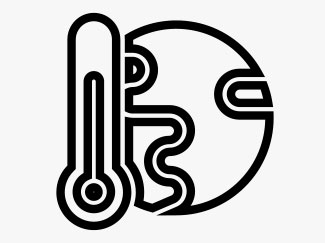
According to the latest IPCC report AR6, global GHG emissions at the current rate will result in 1.5 degrees of global warming over pre-industrial levels by 2035. This is 15 years ahead of the 2050 threshold.

Read the IPCC report AR6
INEQUALITY
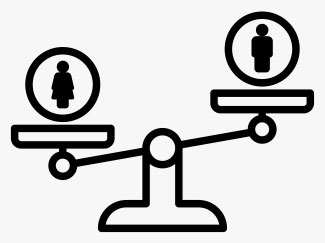
The world over, the participation of women in labour markets tends to be lower than that of men. In India, participation of women in labour is less than 25%. Public health concerns have an impact on the health of a nation. Wage loss due to preventable diseases such as malaria and dengue continues to plague many of the geographies we operate in.
Developing a high-performing and diverse workforce

Our people are the bedrock of our company. We are investing in our human capital and are committed to building an inspiring workplace. We aim to have zero fatalities across our operations, have women represent 30% of our senior leadership positions*, and continue maximising our human capital return on investment (HCROI).

- 1.We have reported zero fatalities across all our operations
- 2.Women represent 47% of the total workforce
- 3.Women represent 25% of senior leadership position
- 4.Our HCROI is 5.7222
Making greener
products
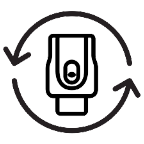
We are continuously reducing the environmental impact of our products and operations and assessing the sustainability of our products from a lifecycle perspective. We use these insights in our product development process to ensure that the products created are good for both the people and the planet. We aim to be Scope 1 and 2 net zero by 2035.

- 1.Reduce, Recycle, Replace approach to sustainable packaging: 34% of our plastic is recyclable, with a 17% reduction in the packaging intensity from the fiscal year 2020
- 2.Completed life-cycle assessments (LCAs) of products constituting over 50% of our revenue
- 3.Innovating for greener products by building an ESG- first product portfolio within our core categories to fulfil environmental imperatives and cater to the changing consumer preferences through our reconstitution and naturals range
Investing in the health and well-being of communities

In our quest to strengthen our social and relationship capital, we are focusing on three key areas of health and well-being. We aim to create a more inclusive and equitable world by fostering sustainable growth, build strong relationships with our stakeholders, and contribute positively to the communities we operate in.

- 1.Partnerships that protect people from vector-borne diseases: Our flagship Elimination of Mosquito- Borne Endemic Diseases (EMBED) programme, supported by the Governments of Madhya Pradesh, Uttar Pradesh, and Chhattisgarh, has reduced malaria incidence by 54% since 2015.
- 2.Waste and water stewardship: Our waste programmes cover 6,34,000 people with source segregation activities, process 1,786 tonnes of waste annually, and recycle 535 tonnes of plastics per annum.
- 3.Championing human rights: We have developed and rolled out a human rights due diligence tool based on the UN Guiding Principles. We have assessed over 95% of our owned operations.
Developing a high-performing
and diverse workforce
Our people are the bedrock of our company. We are investing in our human capital and are committed to building an inspiring place to work.
- 1.We have reported zero fatalities across all our operations
- 2.Women represent 47% of the total workforce
- 3.Women represent 25% of senior leadership positions
- 4.Our HCROI is 5.722
Critical enablers: Health,
safety, and wellness
Health and mental wellness support
Ensuring the health and well-being of our teams has continued to be our key priority. One of the areas we are focusing on is leveraging digitisation to make healthcare more accessible. The Godrej Health and Wellness app has been launched as a one-stop application for all preventive healthcare needs across locations in India. Some of the services as part of this offering include a Doctor On-call service, medicine delivery, as well as laboratory and diagnostic facilities. An emergency ambulance on call service has also been enabled. The coverage extends to over 2,500 pin codes and has recorded over 1,000 downloads, with an average rating of 4.3/5. We have conducted extensive awareness building sessions for this, especially at our factories, to engage our blue collar employees.
Health in emerging economies is of pronounced concern globally. The consequences are more severe for women
Ensuring the health and well-being of our teams has continued to be our key priority. One of the areas we are focusing on is leveraging digitisation to make healthcare more accessible. The Godrej Health and Wellness app has been launched as a one-stop application for all preventive healthcare needs across locations in India. Some of the services as part of this offering include a Doctor On-call service, medicine delivery, as well as laboratory
‘Stop the Snore’ campaign organised to spread
awareness around obstructive sleep apnea
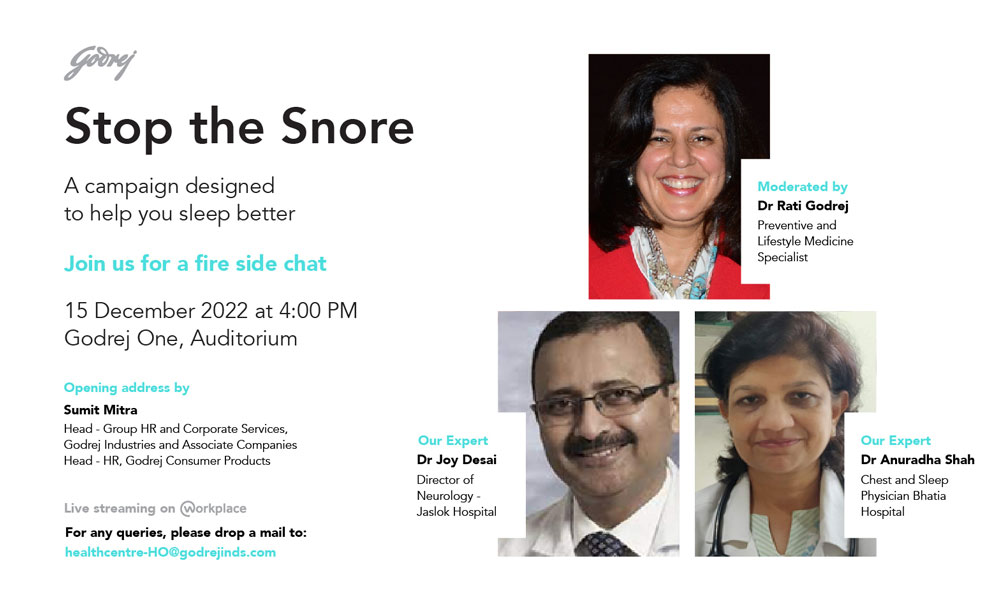
because of complex socioeconomic structures that lead to the lack of preventive diagnosis and appropriate care. In line with our intent to create lasting impact, we wanted to nurture active conversations around areas of women’s health that are underserved and initiate tangible steps to directly impact women team members and women dependents.
We launched EmpowerHer that conducts awareness drives and health camps for issues such as biases against women, menstruation, PCOS, menopause, gender transitioning, and mental well-being. It also has tie-ups with healthcare professionals.
We also organised multiple health sessions across our offices to create holistic health awareness. A major campaign around obstructive sleep apnea called ‘Stop the Snore’ was conducted across all locations.
Furthermore, we have an onsite medical centre, hospital, children’s day care facility, and women’s resting and breast-feeding facility at our headquarters in Mumbai.
Godrej Health and Wellness,
our one-stop app for all
preventative healthcare needs
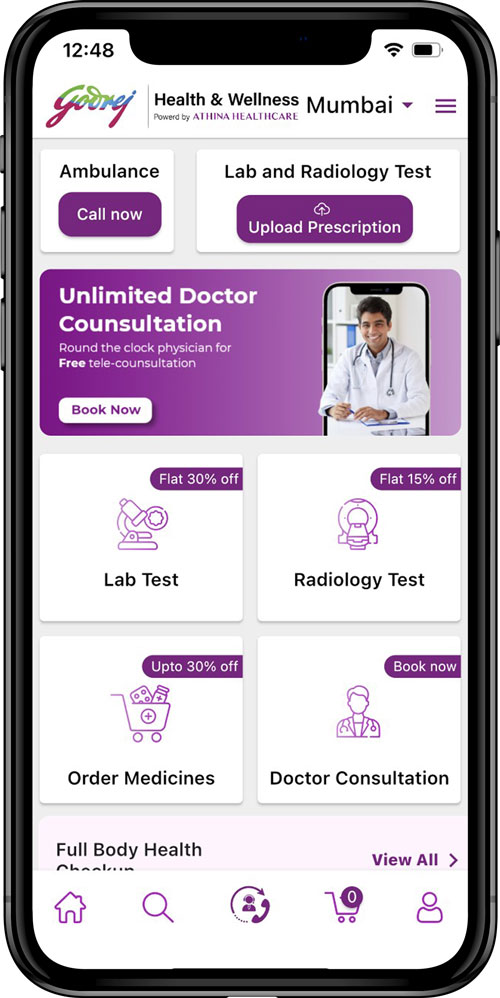
Health camps for our women employees
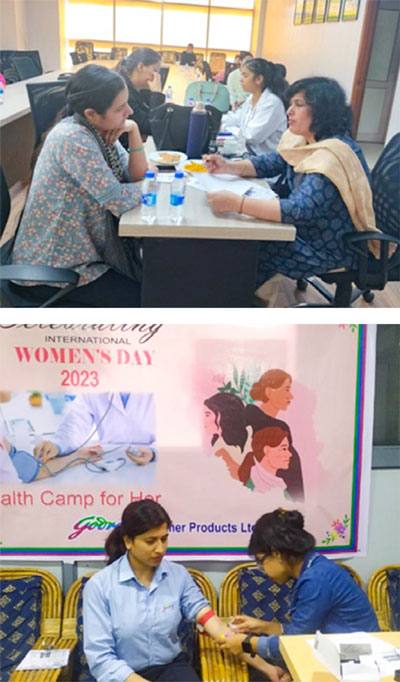
Women and Wellness, an internal awareness
campaign around International Women’s Day 2023
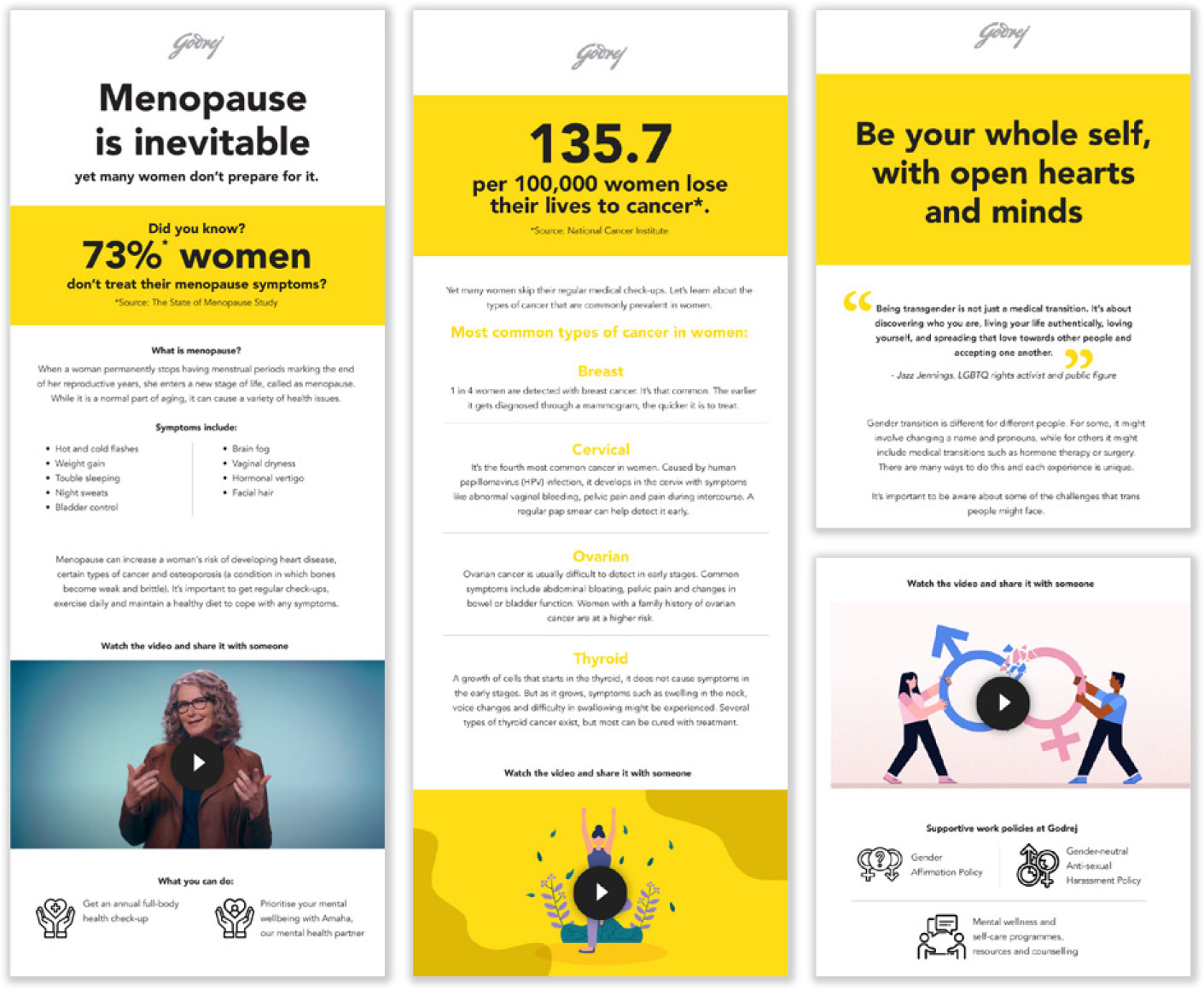
We have partnered with Amaha, a mental health platform, to create an Employee Assistance Programme that offers confidential mental wellness services. Through this service, our team members can avail personalised plans with multiple resources such as self-help, short daily courses, articles, activities, and access to trained therapists.
We have extended this to dependents of Godrejites, including parents, partners, siblings, and children. We are also encouraging open conversations around the importance of mental health by organising webinars with senior therapists and leaders on self-care strategies, strengthening relationships, social media, and mental health, among other themes.
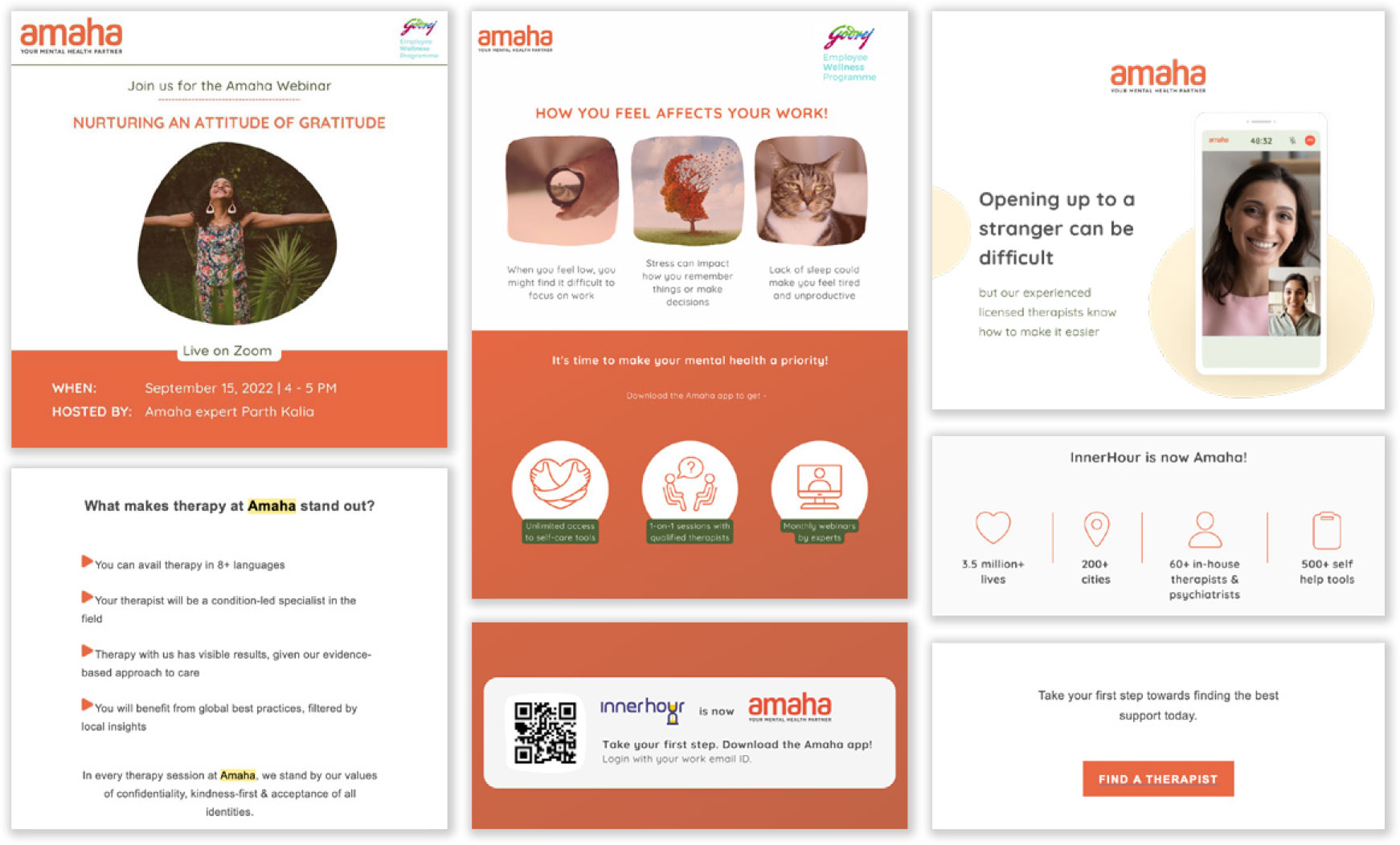
Wellness initiatives in collaboration with
Amaha, our mental wellness partner
Hybrid ways of working
As the COVID-19 pandemic situation across our locations improved, we restarted our hybrid working approach for team members in roles where work could be delivered remotely and did not require continued physical presence in office.
This meant working in office for 3 days a week, with added flexibility on a need-to basis. We stay committed to making Godrej a more agile and inclusive workplace, and at the same time, improving productivity in a more focused manner.
Occupational health and safety
We continue to focus on inculcating a culture of safety and health and creating an incident-free organisation. In line with this vision, we invest in world-class safety infrastructure and implement best-in-class safety systems. Occupational Health and Safety (OHS) Policy serves as a guiding framework to ensure a safe and healthy workplace.
This encompasses aspects such as competent OHS organisation, safety culture and awareness, hazard identification and risk assessment, risk mitigation and controls, continual improvement, loss prevention, accident investigation, emergency management, health and hygiene, and safety performance measurement tools.
We have implemented an innovative assessment and scoring matrix to evaluate the performance of our OHS management system—to gauge the comprehensiveness and effective implementation of the four pillars and ensure its seamless integration into our operations.
To support our ongoing improvement efforts, we have established a well-defined and measurable internal and external audit system. This process has allowed us to identify best practices and uncover enhancement opportunities that in turn contribute to the continuous improvement of our health and safety initiatives.
Our safety and health improvement plan has four pillars:


1. People and culture


2. Safety infrastructure


3. Automation, technology, and artificial intelligence


4. OHS management system
(based on various health and safety standards, including ISO 45001)
We reported zero employee and
contractor fatalities in the last 3
years across our geographies


In last few years, we have made significant changes in our incident reporting protocol, including moving from Indian standard of reportable accident to LTI reporting. Along with leadership focus, we have also increased awareness at all levels around incident classification and reporting. Reporting all incidents is a cardinal rule for us. All these have helped us enhance our reporting.
As a company, we have been investing heavily to upgrade our safety infrastructure. Consequently, we are at a zero-fatality record since the last 2 years. We have also not had any major fire or any other significant property damage.
In fiscal year 2022-23, we were also able to ensure a 20% reduction in LTI numbers in GAUM. Most of our sites in India and SAARC and Indonesia also sustained zero LTI in the last 2 years.
However, we have seen an increase in LTI numbers at one site each in India and Latin America. We have taken all the corrective and preventive actions across all our manufacturing sites to prevent any reoccurrence.
Lost-time injury frequency rate |
Unit |
FY 19-20 |
FY 20-21 |
FY 21-22 |
FY 22-23 |
|---|---|---|---|---|---|
Employees and contractors |
LTIFR (n/million hours worked) LTIR (n/200,000 hours worked) |
0.103 |
0.185 |
0.716 |
0.987 |
We are committed to creating a culture
of safety across all our operations
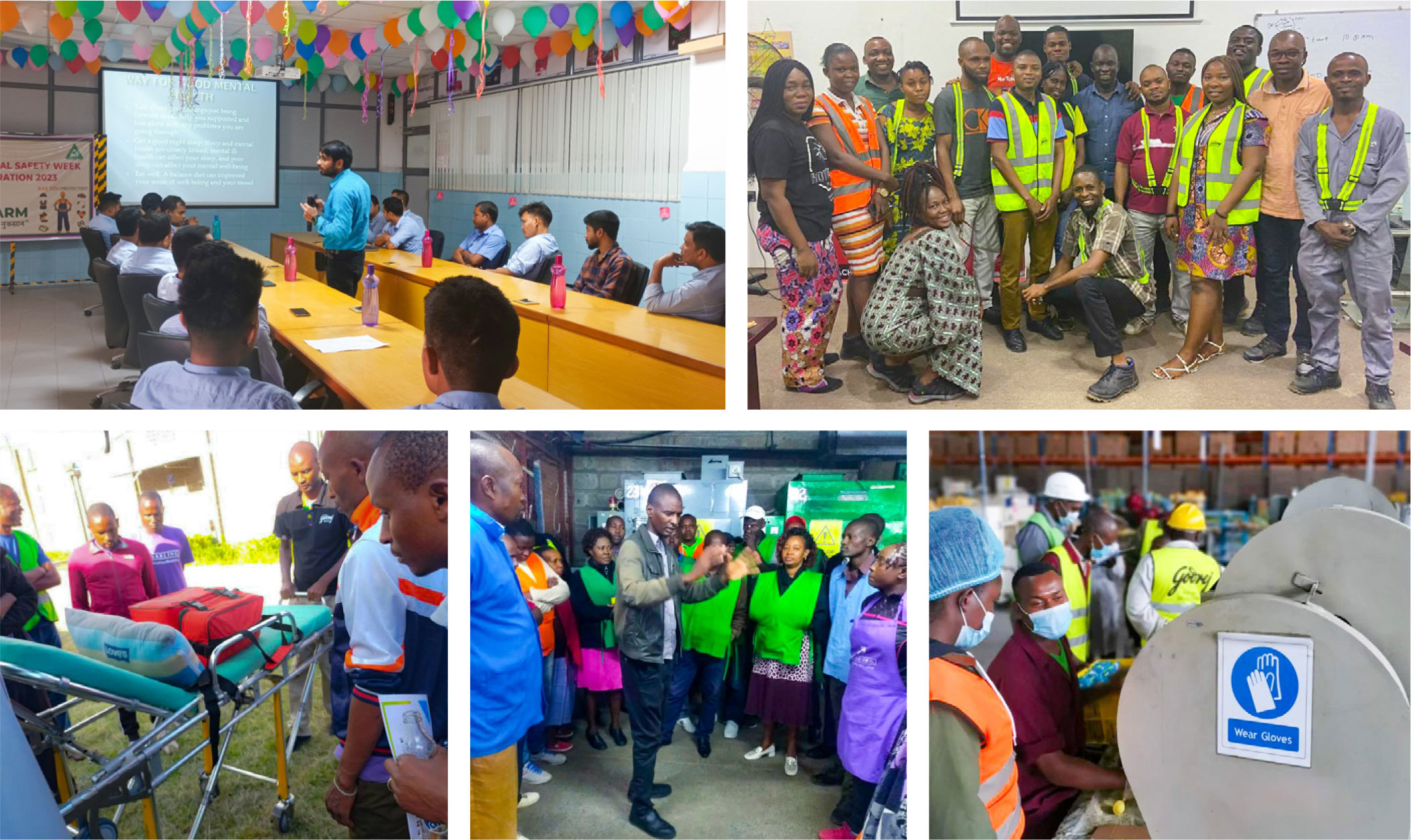
Critical enablers: Diversity, equity, and inclusion
We believe that a diverse and inclusive workforce is core to drive and maintain our competitive edge. It allows us to tap into a broader range of perspectives, skills, and experiences, which, in turn, helps us to better understand and cater to the needs of our consumers. As a global conglomerate, with a vision to delight over 2 billion consumers, becoming inclusive is not just in our DNA and the right thing to do, but it also makes an excellent business sense.
We take pride in being an equal opportunity employer. We recognise merit and encourage diversity. We respect human rights of every individual. We do not discriminate on the basis of gender, sexual orientation, gender identity, religion, political opinion, nationality, race, colour, social origin and status, indigenous status, disability, age, or any other personal characteristic or status. We do not tolerate disrespectful or inappropriate behaviours, harassment, intimidation or unfair treatment, or retaliation of any kind.
Women and leadership
Women represent 47% of our total workforce. Because of our efforts to foster a holistic, supportive workplace, the share of women in all management positions is 32% and that in top management positions is 25%. We are committed to fostering a diverse GCPL and aim to have 30% women representation at senior leadership.
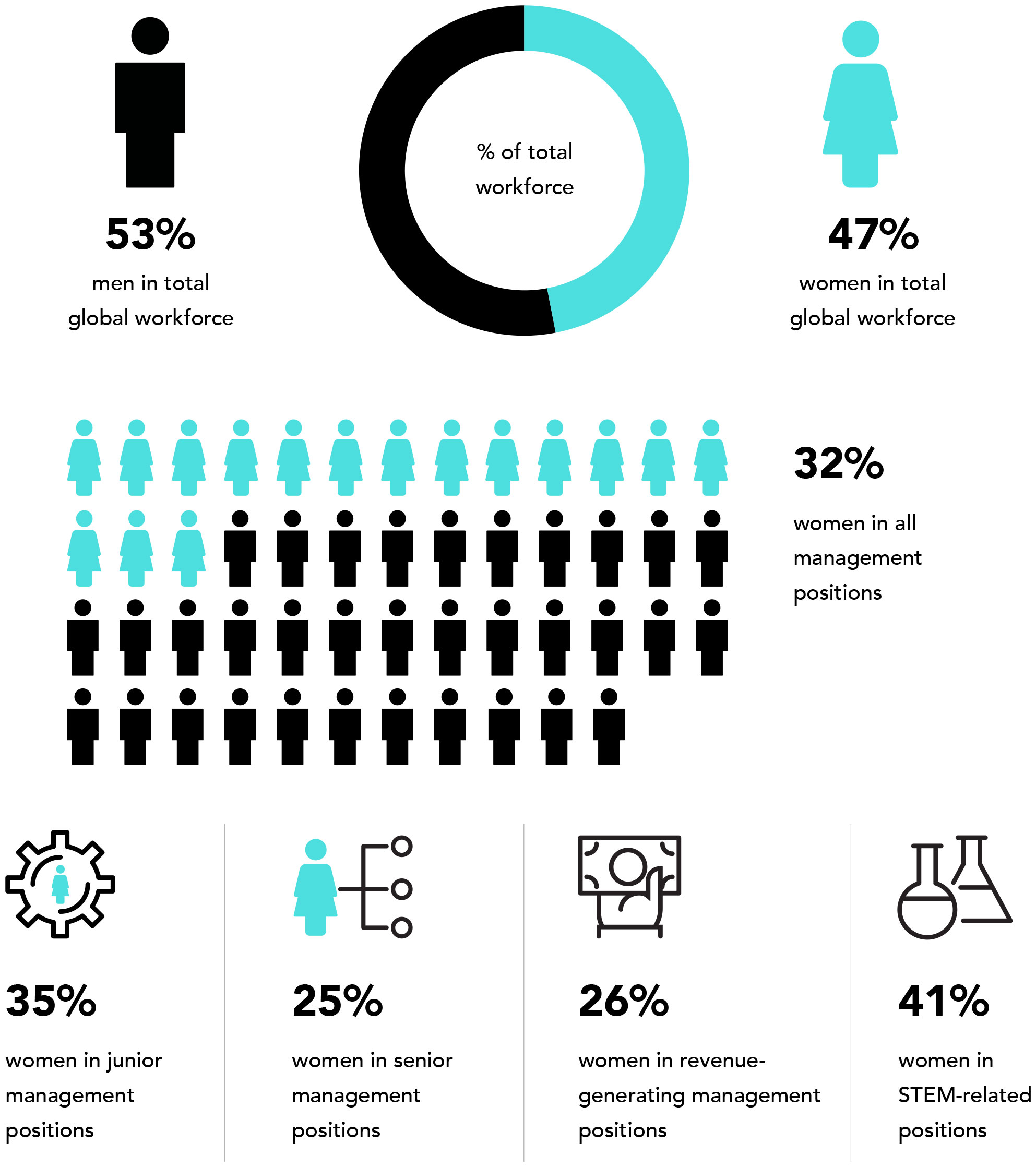
Building the next generation of
women leadership in Sales
A challenge faced by organisations like ours has been the lack of women representation in functions like field sales. In our India business, we have actively tried to bridge this gap by focusing on hiring more women in field sales roles, but we have found it increasingly difficult to build and nurture this talent pool over a sustained period. To hire, train, and induct more women into Sales, we have launched Aarambh, a sales training programme built exclusively for women. The goal of this programme is to onboard a selected cohort of women talent and train them in functional skills through on-the-job learning and leadership guidance. We hosted an open source hiring to tap into new MBA graduates and lateral hires from across industries.
Our cohort of trainees engage with the Godrej leadership as part of Aarambh, our sales training programme built exclusively for women
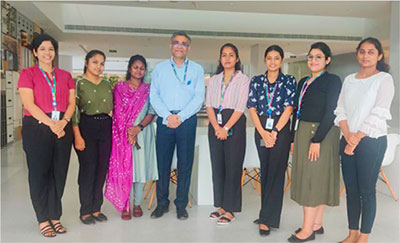
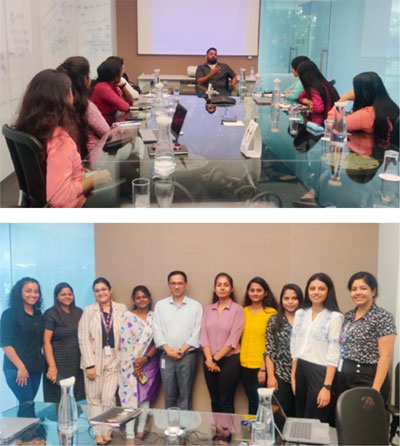
Menstrual wellness for
women in field sales roles
We believe in fostering a culture of trust, respect, and acceptance. Through our conversations regarding different needs of men and women, we identified the need for women to be able to take time off from travel or work during menstruation. This need was more pronounced for women in field roles, where the exertion of outdoor work, coupled with limited or no access to clean and hygienic washrooms, causes extreme discomfort.
To support our women team members, we are:
- Encouraging women to make use of our unlimited sick leave, whenever required
- Encouraging women to avail work from home options in field sales roles
- Improving the existing infrastructure such as the availability of clean washrooms at our major distributor points
Our Sales Leadership Team also hosted sensitisation workshops on menstruation- linked challenges faced by women in field sales roles.
An inclusive ecosystem of policies
and awareness building
Apart from our maternity benefits and day care facilities, we have a Caregiver Travel Policy, which enables new mothers to bring a caregiver and children up to 1 year of age, for necessary work-related travel.
To help build a culture of inclusion among senior leaders and managers, we organised ‘Winning with Empathy’, a conversational and reflection-based workshop on unconscious biases. Through the workshop, we focused on bringing unconscious biases among team managers to the surface, building the emotional intelligence of our people managers, and creating an inclusion framework for managers.
Gender pay analysis
We recognise the significance of fostering an equitable and inclusive work environment, which includes addressing the issue of gender pay disparity.
We are committed to ensuring fair and equal compensation for all our team members, regardless of their gender.
We conduct regular gender pay gap analysis for all our employees at all levels of our company. These assessments are designed to identify any pay discrepancies that may exist between male and female employees, which cannot be explained by merit-based criteria applied consistently over the years.
We are taking proactive steps to address any identified pay disparities. Our approach includes:
- Continuously reviewing our compensation policies and practices to ensure fairness and transparency
- Implementing targeted measures, such as training programmes and career development initiatives, to support the growth and advancement of our female employees
- Fostering a culture of diversity and inclusion through effective communication, education, and employee engagement initiatives
By addressing the gender pay gap, we are not only promoting fairness and equality within our workforce but also creating a more inclusive environment that will drive innovation and contribute to our long-term success.
We remain dedicated to enhancing our efforts to close the gender pay gap and foster a workplace where all employees have equal opportunities to grow and succeed.
India gender pay parity

Building ethnic representation
Sub-Saharan Africa is a key geographic cluster for us. We are deeply committed to building a very purposeful and successful company in Africa. Given the nature of the business that we are operating in, building a representative, diverse talent pool is critical. Therefore, we are actively encouraging local, ethnic hiring across roles. Non-Indian representation in senior leadership roles has increased from 33% in the fiscal year 2021-22 to 40% in the fiscal year 2022-23.
Top 5 workforce nationalities
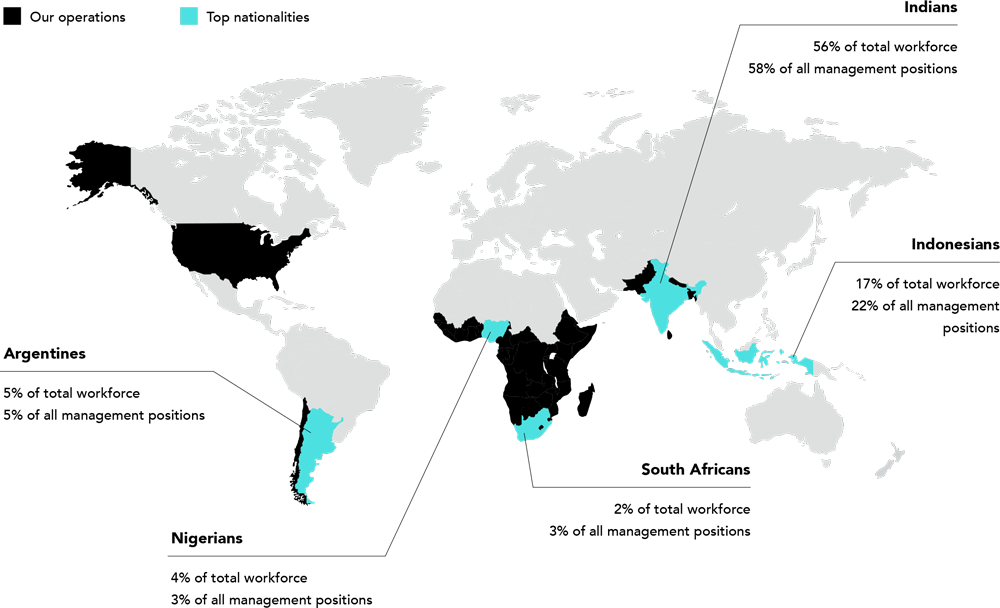
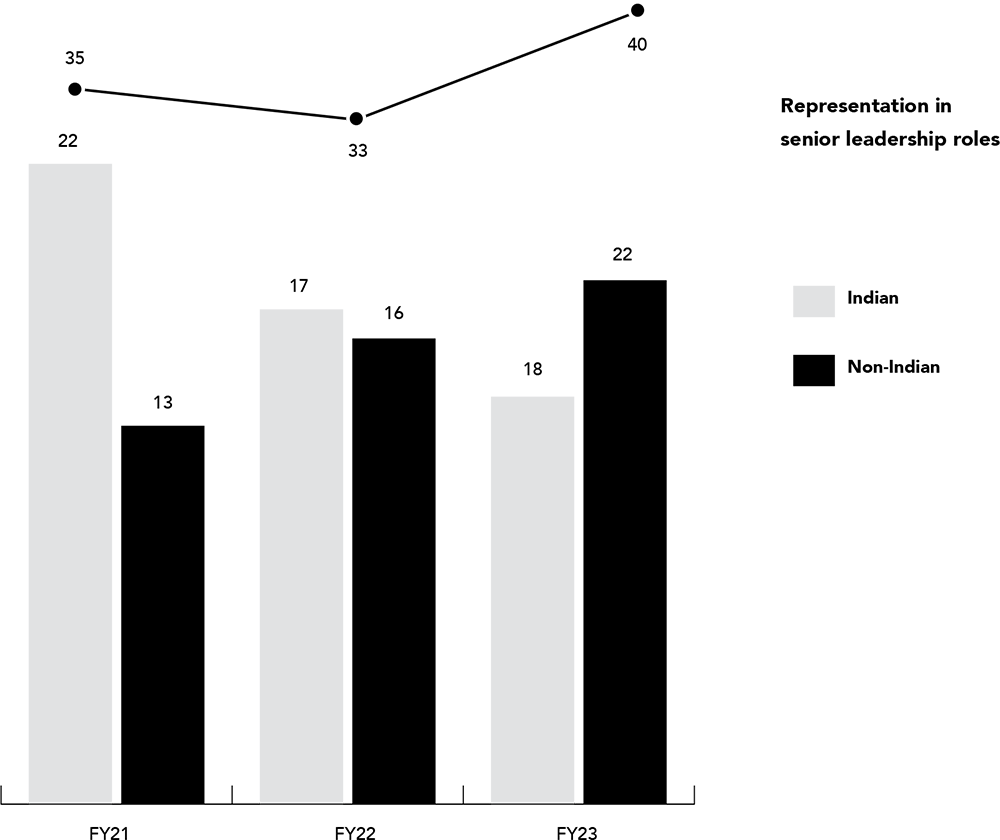

Becoming more diverse and inclusive
LGBT+ inclusion
Our well-defined Equal Opportunity Policy and a Gender-neutral Anti-sexual Harassment Policy aim to protect the rights of our lesbian, gay, bisexual, transgender, queer, and intersex team members. We have extended medical benefits, such as hospitalisation cover, to domestic partners of Godrejites. We allow any team member to choose a spouse/domestic partner as a dependent. This also covers same-sex dependents, AIDS patients, and fertility treatments. Our Adoption Policy, too, is designed keeping a gender-neutral primary caregiver in mind. We have a Gender Affirmation Policy to support team members who wish to undergo gender transition. Godrejites can claim reimbursements towards non-cosmetic surgeries and hormone replacement therapy.
We are reviewing amenities and infrastructure facilities for LGBT+ team members. As the first step, we have established two gender-neutral washrooms at our headquarters, Godrej One, in Mumbai. The Godrej Group was also one of the two Indian companies to win ‘gold’ in India’s first LGBT+ work quality index by the British LGBT+ advocacy group Stonewall, India’s LGBT+ rights Keshav Suri Foundation, and LGBT+ inclusion consultancy Pride Circle. On 13 December 2018, we launched a ‘Manifesto for Trans Inclusion in the Indian Workplace’. Through this programme, we highlighted the position and circumstances of trans people in the Indian society and the steps corporate India can take to improve them.
Prevention of sexual harassment
At Godrej, we are deeply committed towards enabling a safe and inclusive workspace for all our team members, customers, clients, partners, visitors, and other members of our communities and ecosystem, who interact with us. This year, we reviewed and strengthened our Anti-sexual Harassment Policy and processes across our geographies with the help of local HR teams and legal experts. Our policy is gender-neutral and not limited to women.
People of all genders, gender identities, and sexual orientations can file complaints. We have introduced an online platform for redressal to ensure stronger governance. We continue to build awareness through specially designed, compulsory trainings for our Redressal Committee members and all Godrejites at regular intervals.
Our refurbished anti- sexual harassment training module focuses on building awareness around sexual harassment at the workplace
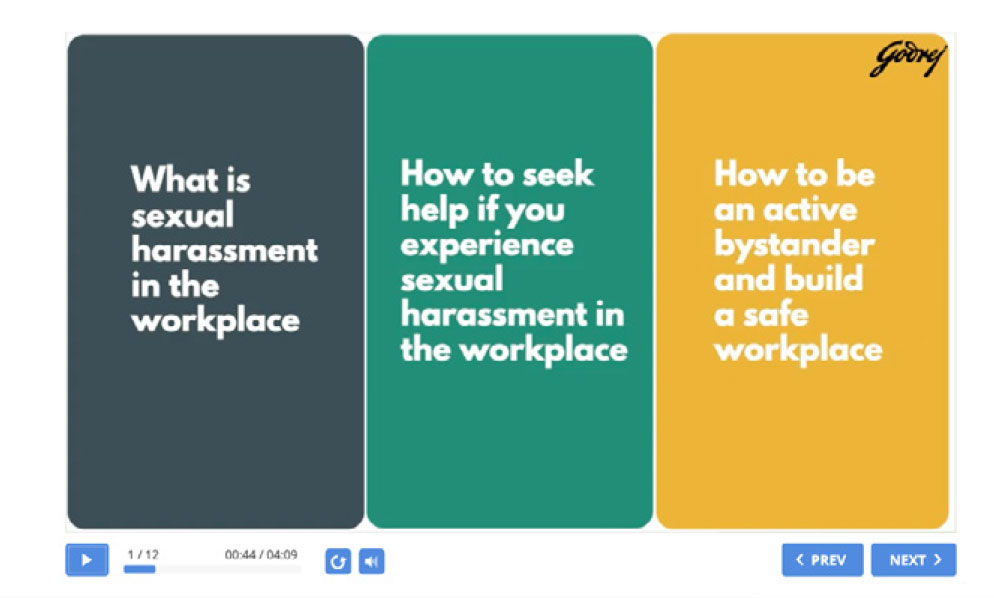
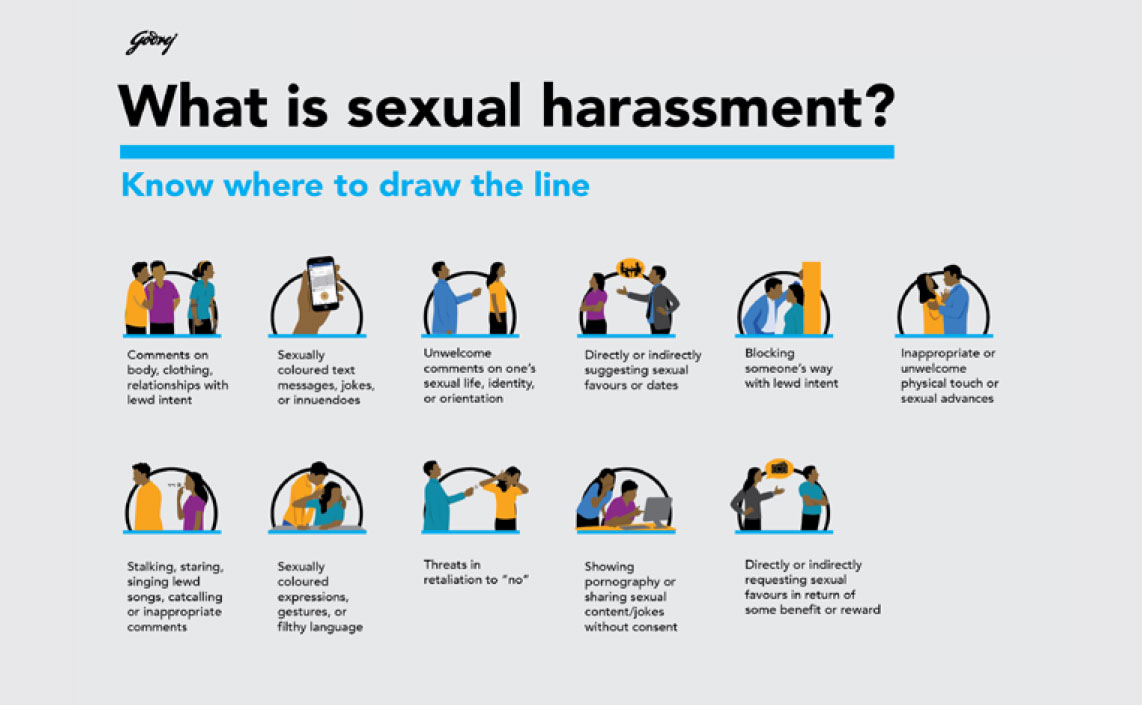
Complaints on |
Complaints filed |
Pending resolution at |
|---|---|---|
FY 21-22 |
4 |
0 |
FY 22-23 |
5 |
2 |
Critical enablers:
Talent development
We invest in the continuous training and development of our employees, ensuring they possess the skills and knowledge required to excel in their roles. We aim to nurture value-based, high- performing leaders to guide our growth ambitions by enhancing the effectiveness of leadership and building a future-ready leadership pipeline.
Living the ‘Godrej Way’
The Godrej Way, which we call our purpose and values, is the cultural cornerstone that guides our choices and actions. We continue to explore ways to build a more purposeful Godrej for all our stakeholders.
Our employee value proposition takes much pride in fostering an inspiring workplace with an agile and high-performance culture to attract, develop, and retain the best global talent.
Our beliefs on leadership, careers,
and capability development
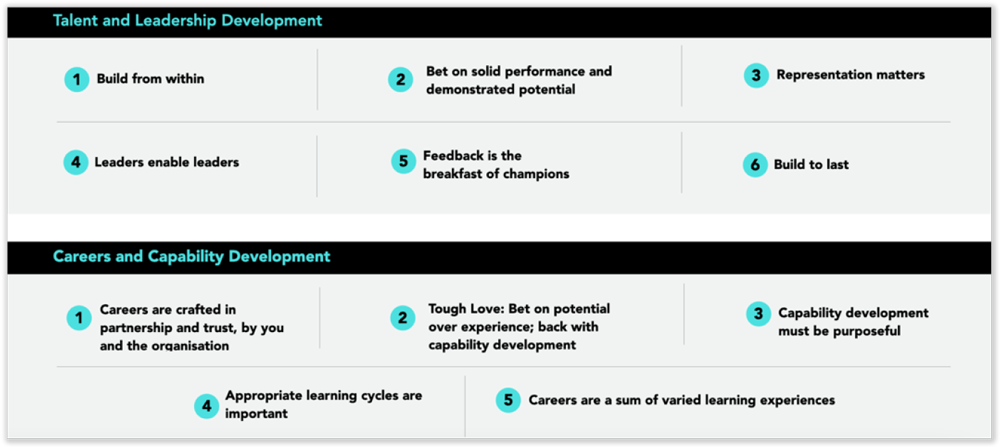
Leadership development across levels
We host customised journeys for key cohorts at different leadership levels, which incorporate multidisciplinary elements for immersive experiences: reflective conversations with mentors and coaches, perspective sharing through structured forums, facilitator-led masterclasses, self-paced learning, and differentiated experiences through capstone projects to apply learning on-the-job.
These programmes are designed with inputs from internal and external stakeholders, best practices from other organisations doing contemporary work in this space, as well as the common developmental themes emerging at Godrej. There are two tracks—a cohort track where the entire batch comes together— and an individual track customised to a participant’s specific learning needs.

Management trainees
Insignia is a 12-18 month learning journey for management trainees who join us from business schools. While they undergo structured business inductions and cross- functional learning stints, this learning programme, which runs in parallel, initiates the early development of critical capabilities and strengthens engagement.

Mid-level managers
Propel is a 12-month leadership development journey for mid-level managers. Currently introduced in India for 21 participants, it will now be implemented across all geographies. The aim of this programme is to help participants sharpen their ability to deliver value across all Godrej Capability Factors (our leadership capability framework) through a journey of holistic development— masterclasses, mentoring by the leadership team, and immersive learning through exposure to strategic projects.

Senior leadership
Accel is a 12-month development opportunity for senior leaders at Godrej Industries. This programme helps them understand more deeply the capabilities required for the next leadership level and learn to action the change through capstone projects. This programme involves a mix of masterclasses and one-on-one coaching with external coaches, mentoring by Godrej leaders, and actioning change through capstone projects. It is also an opportunity to build strong networks across the Group.
Investing in our people through
customised L&D programmes
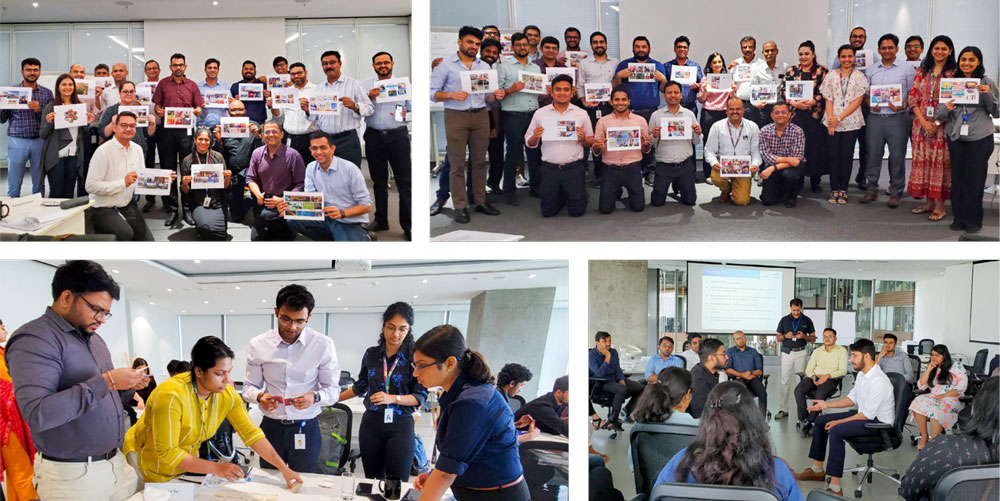
On average, our employees spend 77 hours on training and upskilling. We spend an average of ₹4,33,000 for training every employee on skill upgradation, health and safety, prevention of sexual harassment, and other human rights issues.
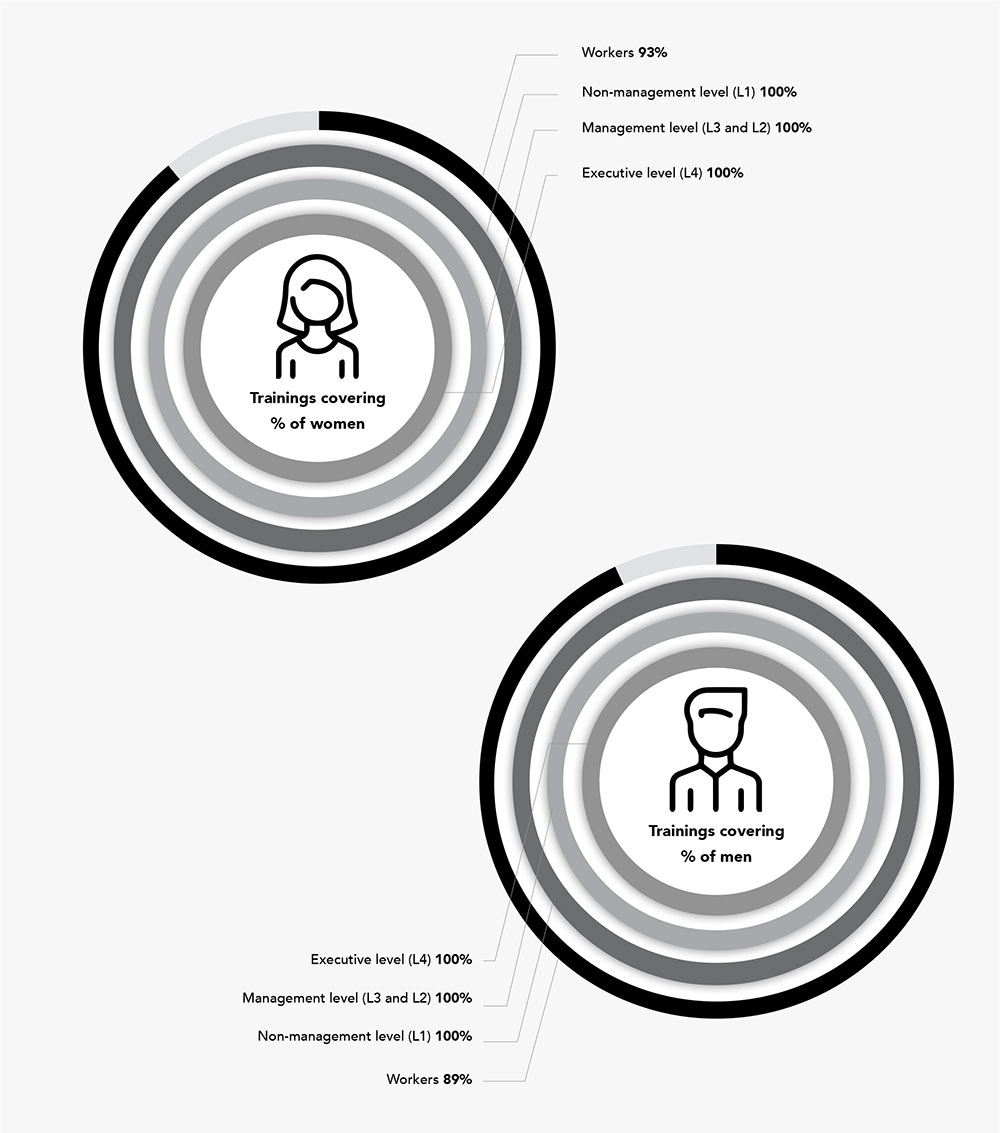
HCROI
We recognise the value that our employees bring in and are committed to maximising their potential to drive our growth and success. To gain insights into the effectiveness of our human capital investments, we measure our HCROI, a key metric that helps us understand the profitability of our organisation in relation to total employee costs.
A higher HCROI indicates that we are effectively leveraging our human capital to generate greater value from our workforce.
By regularly monitoring and analysing our HCROI, we are better equipped to identify trends, evaluate the effectiveness of our human capital strategies, and make data-driven decisions to enhance the value derived from our workforce. This approach allows us to optimise our investments in talent development, recruitment, and retention, thereby ensuring we continue to build a skilled, engaged, and diverse workforce that drives us forward.
|
FY 19-20 |
FY 20-21 |
FY 21-22 |
FY 22-23 |
|---|---|---|---|---|
Total revenue |
54,744,508,957 |
62,543,352,310 |
69,515,608,458 |
76,671,727,945 |
Total operating expenses |
41,660,800,000 |
47,097,701,698 |
53,165,052,855 |
59,094,502,111 |
Total employee- related expenses |
10,091,600,000 |
4,170,900,000 |
3,475,176,893 |
3,721,832,838 |
HCROI (a − (b−c))/c |
2.296 |
4.703 |
5.704 |
5.722 |
Engaging meaningfully
Our senior leadership team engages through different platforms, including town halls and one-on-one conversations. To understand the pulse of our company in real-time for taking immediate action, we made a shift and continued to move from static point in-time conversations and surveys to a culture of continuous listening aim.
We continue to leverage Amber, a chat bot, to interact with team members across geographies. Currently, 1,800 people are being reached out through Amber. Through this platform, we capture people’s experiences at a defined frequency based on their tenure in the company. The feedback has helped us take both faster individual actions and make organisation- level changes based on emerging themes.
Trend of employee well-being
We are above the industry benchmarks. While we use engagement data for insights and action planning, our intent is to maintain engagement scores year-on-year.
|
Unit |
FY 19-20 |
FY 20-21 |
FY 21-22 |
FY 22-23 |
|---|---|---|---|---|---|
Employee engagement |
% of employees with top level of engagement, satisfaction, well-being, or employee net promoter score (eNPS) |
77 |
86 |
86 |
85 |
Employee turnover rate
|
FY 19-20 |
FY 20-21 |
FY 21-22 |
FY 22-23 |
|---|---|---|---|---|
Total employee turnover rate |
17.1 |
11.5 |
23 |
27.4 |
Voluntary employee turnover rate |
9.1 |
4.9 |
15 |
15.8 |
Workplace by Facebook is our in-house social media and engagement platform that helps us stay connected with our teams globally. This year, we had 56% active users and 12.6% engaged users.
The Godrej Leadership Forum is our annual leadership conclave that brings together senior leaders from across Godrej businesses for a day of learning, sharing, and reflections.
Themed around ‘Asking the right questions?’, our leaders came together to not only reflect on the year that was but also collectively reinforce our ambitions for the future, including our commitment towards becoming more sustainable and inclusive.
Learning and sharing at the
Godrej Leadership Forum
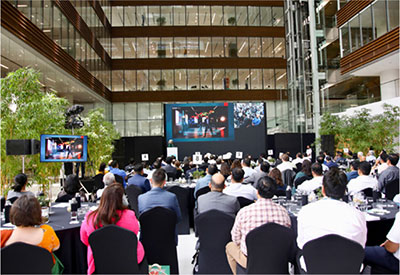
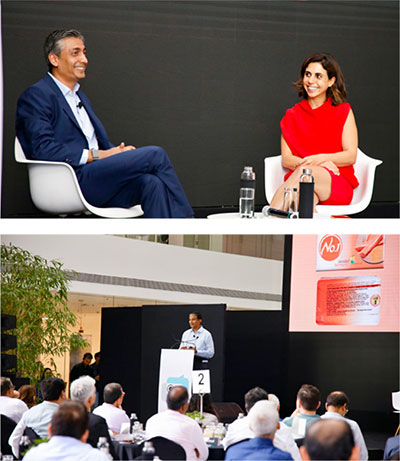
The GCPL Leadership Meet themed on ‘Lead and Inspire’ brought together the senior leadership team from across geographies to reflect on the year and key priorities to build on going forward.
A large part of the day was spent in a workshop on identifying and crafting the legacy that each leader wants to create in the role they are.
GCPL Leadership Meet brings together senior leadership from across the globe
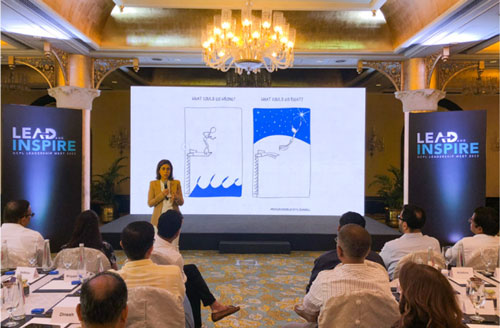
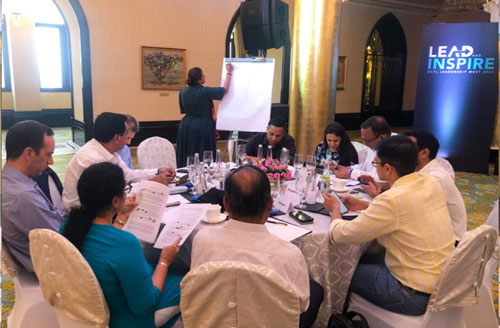
Freedom of association
We recognise the importance of our employees having the opportunity to voice their concerns, opinions, and suggestions. By fostering a strong dialogue between employees and management, we can create a more engaged, empowered, and productive workforce.
In line with this commitment, over 90% of our eligible employees are members of recognised employee associations or collective bargaining groups.
We are dedicated to maintaining an open and inclusive work environment, where all employees have a platform to express their views and actively participate in shaping company policies and practices.
Through our ongoing engagement with employee representatives, we strive to address various workplace concerns, such as working conditions, health and safety, and growth development opportunities. This collaborative approach enables us to continually enhance our workplace policies and practices, ensuring they remain relevant, equitable, and supportive of our employees' needs and aspirations.
We are committed to build a workplace where all our employees feel valued, heard, and empowered to contribute their best. We maintain strong relationships with employee associations to address the diverse needs of our workforce and create a thriving workplace culture that drives long- term value for our stakeholders.
Innovative approach to recruitment
We continue to build an engaging, inclusive employer brand on business school campuses. In line with reflections from the previous year, we recrafted Godrej LOUD (Live Out Ur Dream), our engagement platform, as an immersive experience around various touchpoints. We had 99 students from 8 business schools in India who joined us for a curated experience comprising leadership discussions and business immersions. Of them, we selected 34 students, and 50% of them are women. Through our conversations, we encouraged these young people to reflect on their personal purpose and values and the kind of change they can drive in our world. The conversations were driven by the belief that purposeful, determined young people can grow into future leaders at Godrej.
Engaging with business school
students at Godrej LOUD
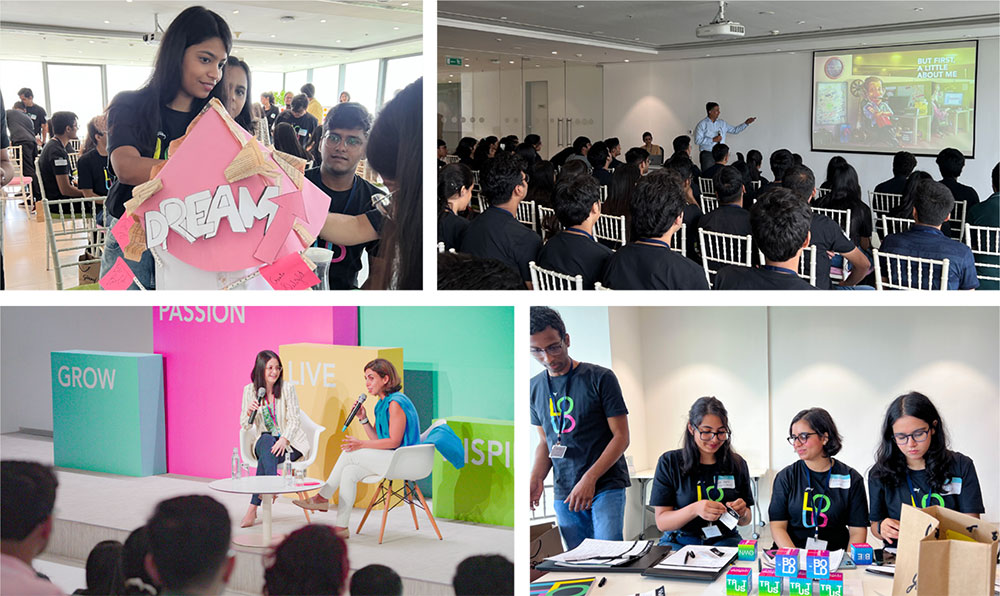
Hiring for potential: Programme NEO
To hire and onboard talent from diverse academic and work experience backgrounds, we launched Programme NEO. Through NEO, we invited applications from experienced professionals who had studied at top universities and wished to reimagine their career journey. Assessed on potential and value-fitment, we hired and onboarded 10 candidates who joined functions such as Sales and Marketing, Supply Chain, IT, and HR. The batch has received various upskilling and training inputs, such as FMCG masterclasses, senior leadership connects, value chain immersions across Sales and Supply Chain, and classroom sessions, to build competency on key behavioural aspects essential to the role.
|
FY 19-20 |
FY 20-21 |
FY 21-22 |
FY 22-23 |
|---|---|---|---|---|
Total number of new employee hires |
360 |
261 |
462 |
481 |
Percentage of open positions filled by internal candidates (internal hires) |
12.1 |
7.8 |
5.4 |
11.9 |
Average hiring cost (₹) |
1,33,000 |
1,11,000 |
1,66,965 |
56,772 |
Recognising and celebrating high performance
Regular performance evaluations and feedback are essential for employee growth, development, and success. To ensure our employees receive the support required to excel in their roles, we have implemented a robust performance review system.
All eligible employees undergo annual performance reviews, which are designed to provide constructive feedback, set clear objectives for the coming year, and identify opportunities for personal and professional development.
These performance reviews enable our employees and their managers to engage in meaningful conversations about past accomplishments, areas for improvement, and future aspirations.
For mid-management and above levels, we complement the performance review process with a 360-degree feedback system. This holistic approach gathers feedback from an employee's peers, subordinates, managers, and sometimes even clients, providing a well-rounded perspective on an individual's performance, leadership capabilities, and interpersonal skills.
For mid-management and above levels, we complement the performance review process with a 360-degree feedback system. This holistic approach gathers
feedback from an employee's peers, subordinates, managers, and sometimes even clients, providing a well-rounded perspective on an individual's performance, leadership capabilities, and interpersonal skills.
Performance and career development reviews of employees
Management level |
Management appraisals by objectives (%) |
360-degree feedback (%) |
Team-based performance appraisal (%) |
Agile conversations (>bi-annual reviews/conversations) (%) |
|---|---|---|---|---|
Executive level (L4) |
100 |
100 |
100 |
100 |
Management level (L3) |
100 |
100 |
100 |
100 |
Management level (L2) |
100 |
0 |
100 |
100 |
Non-management level (L1) |
100 |
0 |
100 |
100 |
The Godrej Way Awards
To recognise people for behaviours in line with our values—Trust, Be Bold, Show Respect, Own It, Be Humble, and Create Delight—we organise the Godrej Way Awards every quarter in India.
The Godrej Awards 2023
The Godrej Awards, organised across the Godrej Group, is dedicated to recognising outstanding performers. We felicitated our winning team members at a special event in our Mumbai headquarters.
Making greener products
We are continuously reducing the environmental impact of our products and operations and assessing the sustainability of our products from a lifecycle perspective. We use these insights in our product development process to create products that are good for both the people and the planet.
Superstar Awards
The most prestigious awards at GCPL in India, the Superstar Awards, recognise the excellence of our team members across all business functions.
Being among the best
companies to work for
We have been among the best companies to work for. We were one of Great Place to Work® Institute’s (India) Best Workplaces in Manufacturing (2022) for creating a high-trust, high-performance culture. We were also recognised as one of the Best Organisations for Women 2023 by the Economic Times for our efforts towards creating a diverse and inclusive GCPL.
Recognising talent and performance
at the Godrej Awards 2023
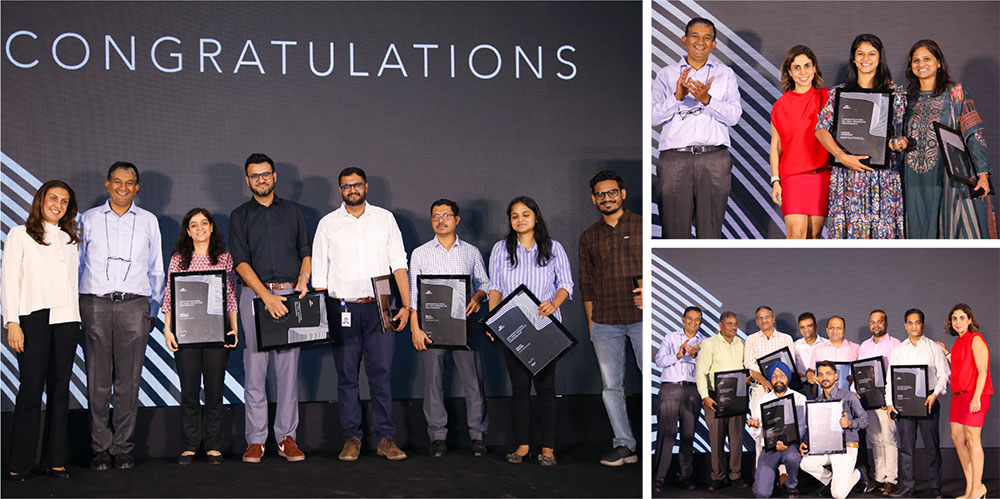
We were one of
Great Place to Work®
Institute’s (India)
Best Workplaces in
Manufacturing (2022)
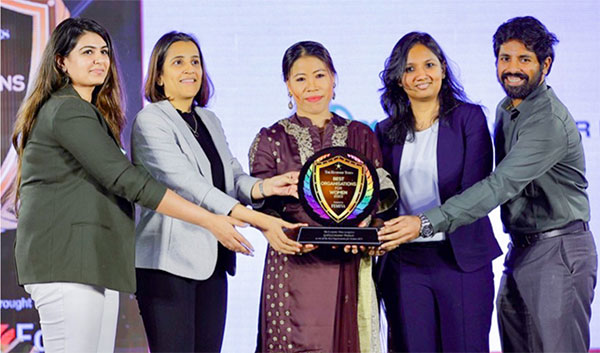
Our commitment to SBTi
We have submitted GHG emission reduction targets to SBTi for validation. We have evaluated the reductions required in our emissions (Scope 1+2+3) and have committed to reducing these emissions in line with the global target determined by the SBTi standards committee.
SBTi’s standards are the world’s first science-based certification of companies' emissions reduction targets in line with the Paris Agreement's goal of keeping planetary warming to 1.5 degrees Celsius. The targets provide a clearly defined pathway for companies to reduce GHG emissions and help prevent the worst impacts of climate change.
We aim to continue reducing emissions by continuously upgrading to energy efficient technologies and processes and increasing the use of clean energy by shifting from fossil fuels to renewable fuels, such as biomass, captive solar, rooftop solar, open access purchase, cogeneration, and green storage. We are also exploring low-energy water recovery systems and nature-based climate solutions for carbon capture.
Net zero by 2035
We have set an internal science-based commitment to be Scope 1 and 2 net zero by 2035. We have already implemented initiatives such as community carbon mitigation programmes to be on track to net zero.
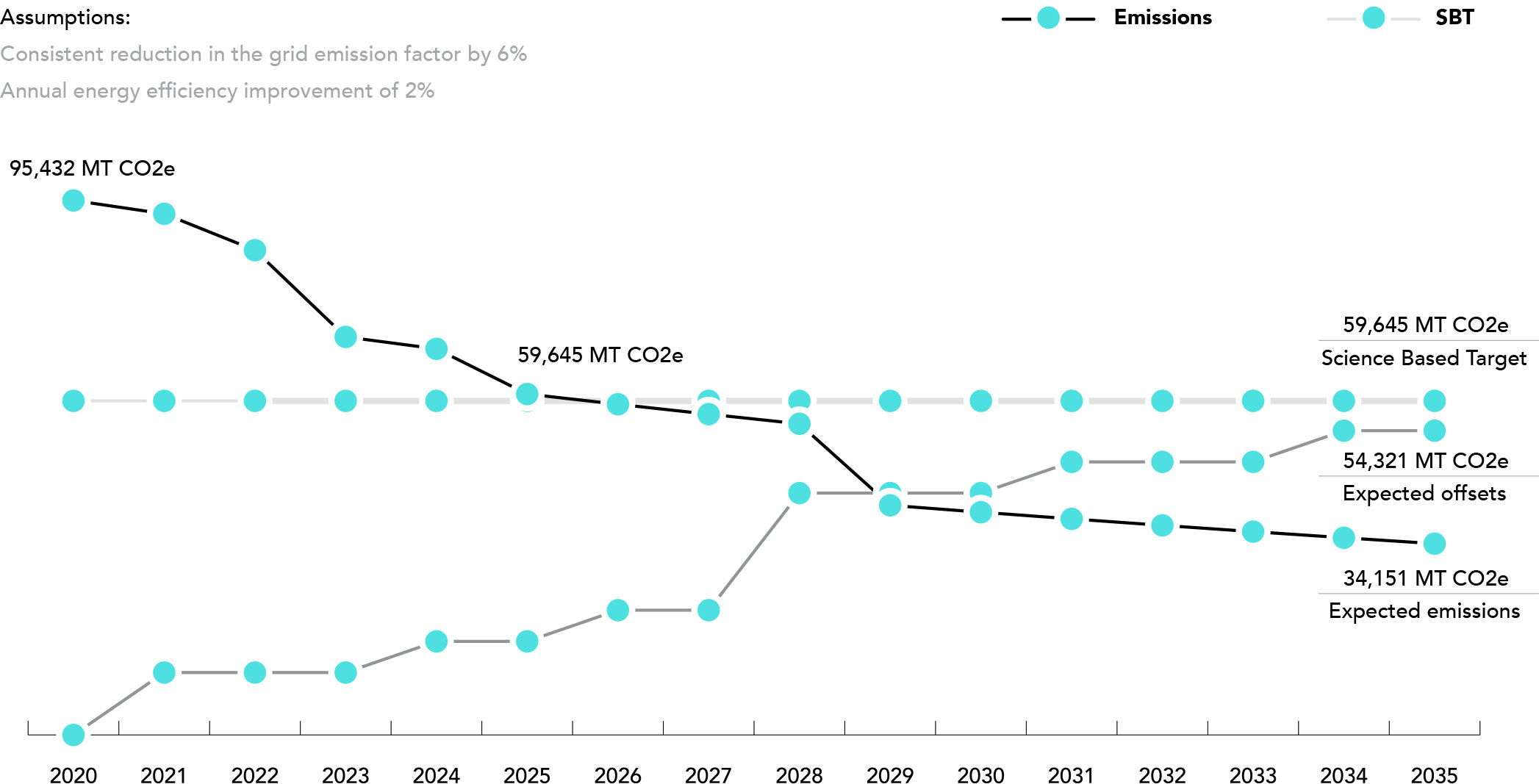
Our projected emissions roadmap
We have a three-pronged approach towards reducing our emissions and are moving towards net zero carbon or carbon neutrality:
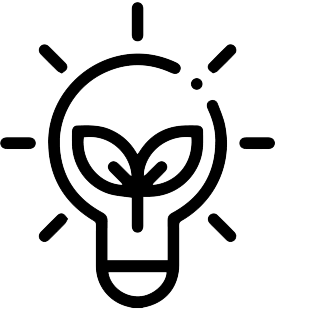
Improving energy efficiency
We reduce emissions by improving the resource efficiency of all our processes, thereby minimising the use of energy, water, and raw materials despite increasing productivity. We also streamline the capacity of our equipment to ensure optimal utilisation and transition to the use of briquette- fired boilers rather than furnace oil-based boilers at our facilities. We believe in open collaboration with our supply chain partners and share our best practices and experiences with them through our Sustainable Supply Chain programme. This programme also includes periodic audits of their sustainability performance.

Increasing use of renewable energy
We increase the use of renewable energy by using briquette-fired boilers and microturbines for steam, investing in solar PV installation, and applying for green tariffs where available. To further improve circularity in this area, we enrich and sell biomass ash generated by the briquette boilers to local farmers for use as a fertiliser.
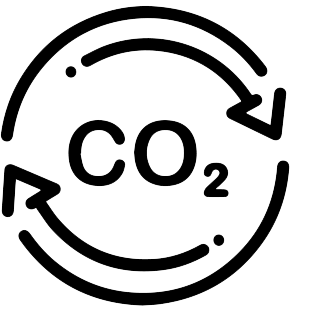
Offsets
We reduce emissions through community-based waste management projects to divert organic waste from landfills or to incinerate and use them for biomass production. We invest in afforestation in degraded land parcels for carbon sink creation and carbon sequestration in our existing watershed projects. This not only conserves water and stores carbon but also reinvigorates natural ecosystems, preserves biodiversity, and improves livelihoods for local farmers.
We are also signatories to the EP100 global framework developed by the Climate Group, where we have committed to halving the energy intensity of our operations by 2030, as against the baseline set in 2012. Currently, we have reduced our emissions by close to 40% and intend to reach the 50% target well before 2030.
Reduce, Recycle, Replace approach to sustainable packaging
Over 34% of our plastic is recyclable. We have reduced our plastic packaging intensity by 17% since the fiscal year 2019-20.
In addition to our good and green targets, at a company level, we have identified sustainable packaging targets.
Read more about our commitment and progress against targets in Radical simplification > Sustainable Packaging Commitment
Highlights in sustainable packaging for the fiscal year 2022-23
Carton packaging for our Goodknight Liquid Vapouriser refills contributed to 3,500 MT of our plastic packaging. It falls under category III plastic under the EPR regulations. We converted these metalised cartons to non-metalised cartons. This resulted in three-fold benefit—one, we reduced our plastic packaging consumption by 3,500 MT. Two, we reduced our EPR obligation by 3,500 MT, and three, we achieved significant cost savings over this project.
Innovating for good and green products
This involves building an ESG-first product portfolio within our core categories to fulfil environmental imperatives and cater to the changing consumer preferences through our reconstitution and naturals ranges.
We aim to carry out LCAs for our major products that cover 80% of our revenue by the fiscal year 2025-26. Further, we will implement the findings of the assessment to manufacture greener products and implement a sustainable framework for all new product developments.
Highlights from the fiscal year 2022-23
- We completed LCAs for 6 products that constitute over 50% of our revenue
- For Goodknight Coils, we completed trials using PCR plastic for Coil poly bags
- For Goodknight Xpress Liquid Vapouriser, we explored PCR PET sources and tested trails.
We aim to complete LCAs of more than 80% of our products by revenue by 2025. LCAs help us assess the step in the value chain at which we can minimise our environmental impact on all fronts—energy, water, plastic, and waste. We are also identifying and testing alternate packaging materials and increasing the use of PCR plastic to move away from virgin plastic. Apart from just regulatory compliance with the EPR plastic waste management guidelines, we are working on innovations in formulation, design, and delivery models to lower our plastic footprint.
Read more about our green innovation and green products in Radical simplification > Sustainability built into our products from day 1
Human rights in the workplace
GCPL is committed to ensuring human rights as part of our vision to help build a more equitable, inclusive, and greener world. Our respect for and commitment to human rights is central to our values. We believe that our primary human rights responsibilities are towards our employees, the communities where we operate, suppliers and business partners, and customers and consumers.
Our commitment to human rights is reflected in our Human Rights Policy, Sustainable Supply Chain Policy, Anti-sexual Harassment Policy, and Code of Conduct for Employees, Senior Managers, and Directors. These policies are available on our website.
GCPL has integrated human rights across its businesses by creating a multi-pronged approach starting from Board oversight to implementation by operations teams, monitoring by audit teams, and ably supported by HR at all levels.
- GCPL has a dedicated Board-level committee for ESG where human rights is the key topic of discussion. The committee meets bi-annually to review the risks associated with ESG, mitigation strategies, and emerging areas of focus.
- The Internal Audit team is responsible for compliance to all local laws and our Human Rights Policy. They periodically review operations across all geographies and help ensure the highest levels of adherence.
- Undercutting all this is the culture of Godrej, and the HR team plays a stewardship role in enabling a culture of respect, dignity, and empathy. Our culture is encapsulated in our values and is part of how Godrejites are assessed and evaluated on an annual basis.
- Our Sustainable Supply Chain policy focuses on responsible conduct with all stakeholders, employee health and safety, local community development, business integrity and ethics, and human rights. The PSO team works with suppliers to ensure adherence to the policy. While a third party is involved in the audits, the PSO team regularly engages with the suppliers to encourage and share best practices.
In the fiscal year 2022-23, GCPL undertook the following activities to ensure that human rights commitments are met:
- All new recruits certified that they understand and accept the GCPL Code of Conduct, which includes our Human Rights Commitment.
- We conducted a self-assessment across our plants and locations in India and Indonesia, covering 93% of our blue collar workforce.
- In India, we have conducted third-party audits comprising 128 suppliers so far (accounting for approximately 70% of our procurement spends). None of the suppliers were non-compliant.
In accordance with our ongoing commitment to upholding human rights in our operations, we have identified and addressed gaps through self-assessments and have taken proactive measures to strengthen labour contracts for our contract workers in India. In addition to adhering to local labour laws, we have introduced stricter terms and conditions, focusing on:

Zero tolerance
for discrimination
Zero tolerance
for forced labour, with an emphasis on not withholding workers' ID papers, no recruitment fees, and ensuring no workers are indebted or coerced to work in any manner.
To further our human rights mitigation and remediation efforts, we have established a cross-functional working committee consisting of representatives from various functions and clusters. This committee is responsible for driving the implementation of human rights mitigation plans across our operations.
As of April 2023, 29% of our manufacturing sites have successfully incorporated these human rights mitigation plans. Our aim is to continue expanding these efforts, ensuring that all our facilities adhere to the highest standards of human rights and fair labour practices, thereby demonstrating our unwavering dedication to creating a positive, inclusive, and empowering work environment for all our employees and partners.
Going forward, we aim to work on some of our salient human rights commitments with the support of our stakeholders. In the fiscal year 2023-24, we commit to:
- Articulate our ambition to work on select salient aspects such as ensuring our own processes and supply chain are free from forced labour
- Create an action plan for all sites to achieve the stated ambition
- Use the fiscal year 2022-23 self- assessment data as baseline and report progress
Protecting people from vector-borne diseases
Project EMBED was started in 2015 in Madhya Pradesh in partnership with the Ministry of Health and Family Welfare’s National Centre for Vector-borne Diseases Control (erstwhile NCVBDC), focusing on malaria elimination, in line with the Government of India’s mission to eliminate malaria by 2030. Over the past 6 years, we extended our initiative to Uttar Pradesh and Chhattisgarh. We collaborated with the state governments of Madhya Pradesh, Uttar Pradesh, and Chhattisgarh and our NGO partner to run intensive behaviour change programmes in regions with a high annual parasite index, where the case burden is the highest.
We worked in each location for 3 years, spreading awareness among households and people at the bottom of the pyramid and vulnerable and marginalised groups. In the fiscal year 2022-23, the malaria elimination project ran across 9 districts: Balaghat, Sheopur, and Shivpuri in Madhya Pradesh; Badaun, Bareilly, Mirzapur, and Sonbhadra in Uttar Pradesh; and Bastar and Kondagaon in Chhattisgarh. We received formal acknowledgement from the state governments of Madhya Pradesh and Uttar Pradesh in recognition of our efforts to help Madhya Pradesh move from a Category 3 to a Category 1 state in malaria elimination. Similarly, we supported Uttar Pradesh to move from Category 2 to Category 1.
In the fiscal year 2020-21, we initiated interventions on dengue and chikungunya prevention in urban areas of the aforementioned three states. Our urban dengue and chikungunya project, spread across nine cities, focuses on increasing the awareness of urban poor communities regarding the spread of mosquito-borne diseases and educating them regarding how to keep their families and communities safe. The project currently runs in Bhopal, Gwalior, Indore, and Jabalpur in Madhya Pradesh; Lucknow, Kanpur, Agra, and Meerut in Uttar Pradesh; and Raipur in Chhattisgarh. It aims to reduce dengue and chikungunya cases and associated mortality.
The interventions under this project cover the following:
- Home visits to provide education and awareness on the diseases and prevention
- Community campaigns for mass awareness
- Digital outreach with SMS, WhatsApp, interactive voice response, and community radio
- Mobilisation and training of community volunteers who act as health champions in intervention communities
- Training public healthcare providers on neglected tropical diseases such as dengue and chikungunya
- Engagement with private healthcare practitioners
- Engagement with local public health authorities, schools and colleges, resident welfare associations, and professional associations
Our third project under EMBED focuses on providing technical support to the Government of India and Government of Uttar Pradesh to help develop an integrated vector management protocol and support its roll out in endemic states.
This project aims to:
- Develop integrated vector management (IVM) protocols for short- term and long-term interventions
- Provide information, education, and communicate behaviour change activities for at-risk communities by using an IVM approach for vector- borne disease control
- Strengthen existing health systems and providers through capacity building on case identification, treatment, and referral and providing technical support
- Foster sustainable partnerships across multisectoral stakeholders to employ a collaborative approach
- Build the capacity of the state and district for outbreak investigation and management
A third-party impact assessment of the rural malaria intervention was conducted in the fiscal year 2021-22. The survey ran across 4 districts of Madhya Pradesh, namely Shivpuri, Sheopur, Alirajpur, and Jhabua—1.5 years after the completion of the project and exit from December 2021 to February 2022. The study revealed that community awareness about malaria symptoms remains high at 98% and that for malaria testing when people have fever is at 70% among the respondents. This has led to frequent testing, timely treatment, and faster recovery. Of the households that participated in the study, 92% are actively taking measures to keep their home and surroundings clean to ensure no mosquito- breeding spaces exist in the community. The SROI value for the overall programme is ₹12.57, that is, for every Rupee invested, the programme provides a value of ₹12.57.
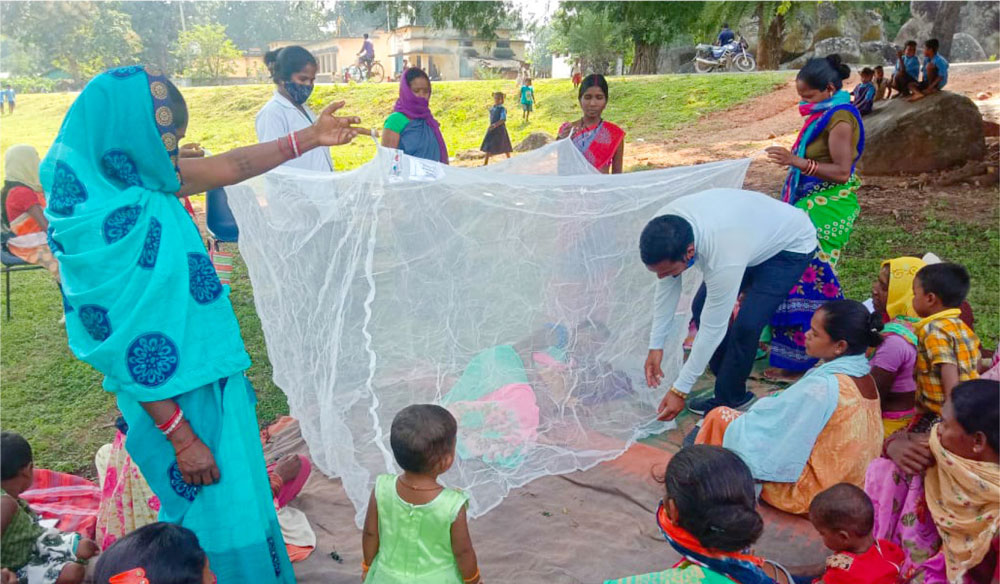
Protecting communities
and spreading
awareness around
vector-borne diseases
through Project EMBED
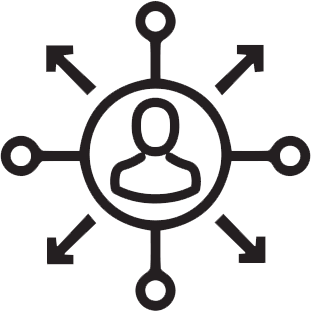
Outreach
- In the fiscal year 2022-23, our rural malaria programmes reached out to 194,918 households in 1,129 villages in 9 districts across Madhya Pradesh, Uttar Pradesh, and Chhattisgarh.
- Our urban dengue programme reached out to 280,500 households in over 2,000 urban settlements in 9 cities in Uttar Pradesh, Madhya Pradesh, and Chhattisgarh.
- Via our technical support to GoI and GoUP on the integrated vector management project, approximately 20 million people were covered.
- In total, 3,452 ASHA workers were trained in the prevention and control methods for vector-borne diseases
- In total, 372 participants attended training on entomological surveillance, clinical management of malaria, and outbreak investigation.
- A total of 20 outbreak surveillance visits were carried out with NCVBDC and GoUP to manage dengue and Zika outbreaks.

Impact
- In our rural malaria project, we have met the target of zero malaria cases in 4 out of 9 districts (Mirzapur and Sonbhadra in Uttar Pradesh and Sheopur and Shivpuri in Madhya Pradesh). Further, we have seen a 44% reduction in SPR, and the treatment completion rate is up by 18%.
- Fever testing has increased by 332%, and a 36% reduction in dengue cases has been reported in geographies where we carried out the intervention. This has, to a large extent, been due to our successful integration with communities and cross linkages between different municipal departments. Finally, we partnered with the NCVBDC to organise a ‘Technical Symposium on Dengue’ in New Delhi on 22 and 23 March 2023 under the Chairmanship of Union Secretary, Ministry of Health and Family Welfare. The main objective of this symposium was to develop a strategic plan and roadmap for dengue control in India along with inputs from endemic states. A draft plan has been created and will be finalised and implemented by August 2023. This framework will become the foundation for GoI and all endemic states to manage and control dengue, chikungunya, and Zika type diseases.
- Through the successful implementation of all three projects, we have reached out to over 28.2 million people at the end of the fiscal year 2022-23, and by the fiscal year 2025-26, we aim to protect 30 million people against vector-borne diseases.
Transforming solid waste and plastic management
As a global FMCG player and responsible corporate citizen, GCPL is committed to reducing waste across all its plants, processes, products, and supply chain. To this end, we have been sending zero waste to landfills from our manufacturing units for the last 4 financial years. Beyond addressing the waste from our manufacturing processes, GCPL recognises its responsibility to work with communities to manage waste. We do this not just by collecting back 100% of the plastic waste generated by us every year as per Indian EPR laws; we go beyond and work with civic agencies, social enterprises, and citizens’ groups to ensure that we work as partners to increase the reuse of material and recycle as much as possible.
To this end, we have invested in helping communities around our offices and plant locations to identify and mitigate their waste-related issues through various interventions by using circular economy principles.
Since the fiscal year 2020-21, we have partnered with the Puducherry Municipal Corporation to implement a community waste management project, thus reaching out to over 200,000 people. We are digitally tracking the waste management process and creating awareness on door-to-door collection and source segregation. We have diverted over 541 MT of waste from landfills through clean-up drives and established a sanitation park that now processes 4TPD of waste.
We have provided access to medical camps to 385 waste workers. Further, the implementation team has proposed a detailed project plan to the Government of Puducherry. It also includes the action plan for sustainable waste management solutions for the state. This DPR has become the basis for the new tenders being released by the government.
In September 2022, we initiated an end-to-end waste management project in the newly formed Malanpur Nagar Parishad, where one of GCPL's oldest and biggest factories is based. The 3-year project will operate in all 15 wards of the Nagar Parishad, with the aim of sending zero waste to landfill and breaking even on the operational cost of solid waste management by the third year. In the fiscal year 2022-23, the project has diverted 383 MT of waste from landfills.
GCPL has initiated an integrated decentralised solid waste management system in Palashbari Municipal Board in Kamrup district of Assam in October 2022. The Kamrup district currently houses several GCPL manufacturing units. To reach optimal capacity and break even from an operational cost perspective, the project will cover all 10 municipality wards as well as the surrounding commercial zones that are open to partnering. In the fiscal year 2022-23, the project has diverted 125 MT of waste from landfills.
Baddi in Solan district of Himachal Pradesh houses two GCPL factories. Kasauli is one of the well-known tourist destinations in Solan district. A municipal waste management project was initiated to tackle the growing garbage issue in the region that mars the natural beauty of the geography. In the fiscal year 2022-23, we undertook a detailed baseline assessment in the Kasauli cantonment area and five surrounding Panchayats (local population from the 2011 census is approximately 8,000 + 35,000 tourists annually). In addition to the baseline, we conducted several cleaning drives around garbage blackspots, established waste-themed art installations to create interest in citizens and tourists, and worked with school children to build awareness about the issue. Through various cleaning drives in this project, we have diverted 325 kg of waste. The full-scale implementation will begin in the fiscal year 2023-24.
The state of Goa is one of the largest tourist hubs in the country and therefore needs to continually focus on waste management to ensure no negative impact on its natural beauty. In the fiscal year 2022-23, GCPL in partnership with the Goa State Pollution Control Board and Goa Waste Management Corporation initiated a 3-year waste management project with Bicholim and Sattari Municipal Councils. The project is being implemented by the Mineral Foundation of Goa in partnership with Sampurna Earth. This project will cater to approximately 2.9 lakh people in the region. In the fiscal year 2022-23, the project has diverted 678 MT of waste from landfill.
Through the successful implementation, we intend to transform waste management systems of 7 municipalities and divert over 5,000 MT of waste from landfills by 2025-26.
We are actively working in our communities to
manage solid waste and recycle as much as possible
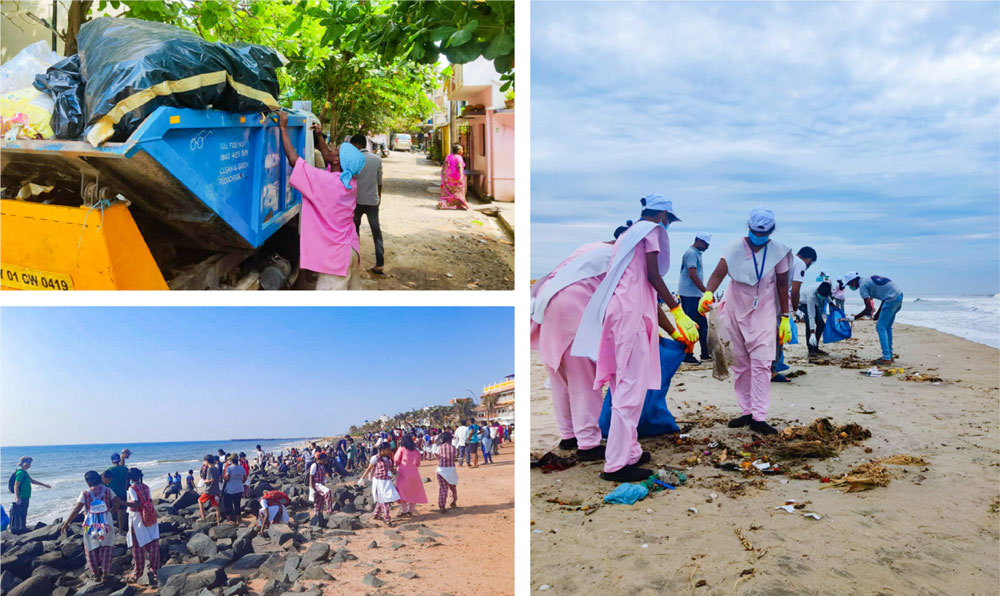
Integrated watershed
management
Our integrated watershed development project is helping restore the ecological balance in the drought-prone district of Siddipet in Telangana. Currently, groundwater levels are lower than 400 ft in many areas. Consequently, farmers are under acute pressure. We are partnering with NABARD and a local NGO to rejuvenate the land, recharge groundwater levels, facilitate necessary irrigation, increase cropping cycles, improve the quality and quantity of produce, enhance livelihoods, and ensure sustainable agriculture practices.
Output
We have completed the treatment of 1,778 hectares of land, covering 66% of the total area under the project. To date, we have provided over 8.5 lakh saplings for direct and seed dibbling. The project has developed 39 pandals and installed 25 drip irrigation systems at farmer lands, with a 30% contribution from the beneficiary farmer. We have trained over 100 farmers on alternate agricultural practices, and the income impact of this training will be reported in the fiscal year 2023-24.
By the fiscal year 2023-24, we aim to treat 3,234 hectares of land, conserve 3.5 million kL of water per year, sink 30,000 tCO2 per annum, as well as build the capacity of the whole community on water management and sustainable agriculture.
Investing in watershed management
to help restore ecological balance
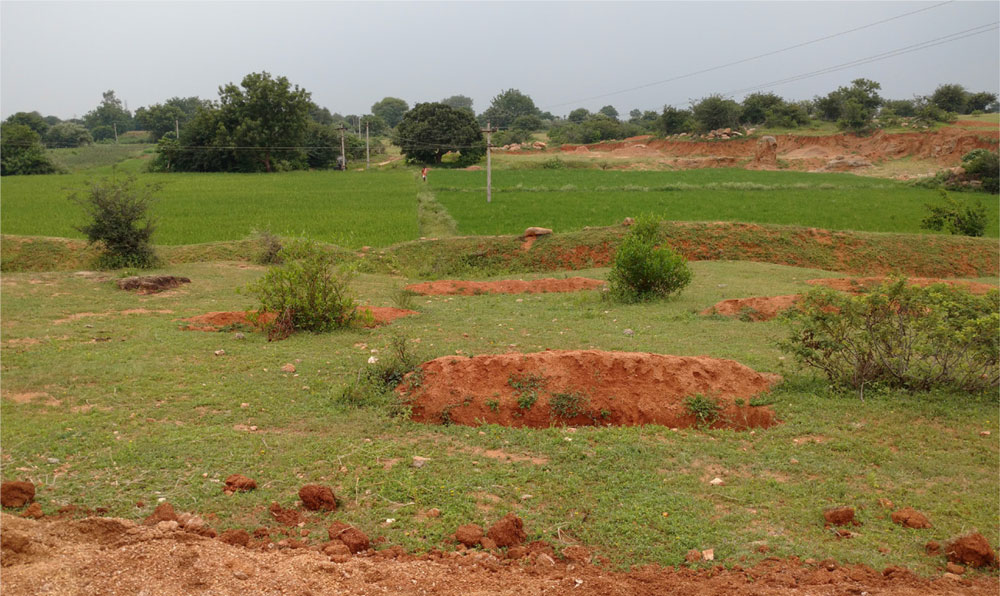
Previous
Funded by radical
simplification

